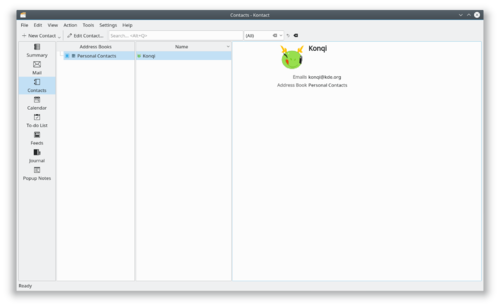KAddressBook: Difference between revisions
Appearance
Marked this version for translation |
Marked this version for translation |
||
| (One intermediate revision by the same user not shown) | |||
| Line 27: | Line 27: | ||
<!--T:20--> | <!--T:20--> | ||
The page [[Special:myLanguage/Akonadi_and_AddressBook|Akonadi and AddressBook]] helps you understand the structure of KAddressBook, so that you can be sure that you have backed up all that you need. | The page [[Special:myLanguage/Akonadi_and_AddressBook|Akonadi and AddressBook]] helps you understand the structure of KAddressBook, so that you can be sure that you have backed up all that you need. | ||
<!--T:37--> | |||
{{KontactInstall|KAddressBook}} | |||
== More Information == <!--T:35--> | == More Information == <!--T:35--> | ||
Latest revision as of 00:03, 31 January 2019

Introduction
KAddressBook stores all the personal details of your family, friends and other contacts. It supports large variety of services, including NextCloud, Kolab, Google Contacts, Microsoft Exchange (EWS) or any standard CalDAV server.
Tutorials
Getting started
Connect to an external service?
- Synchronizing NextCloud with KDE PIM (NextCloud Documentation)
Backing up your Data
The page Akonadi and AddressBook helps you understand the structure of KAddressBook, so that you can be sure that you have backed up all that you need.
Download
KAddressBook is available in all major Linux distribution repositories, as tarballs, and soon a Flatpak version will also be available. Ancient versions were compatible with Windows, the Kontact team is looking for help to improve Windows support. For more information look at the Kontact download page.

